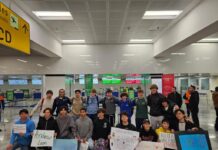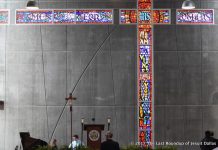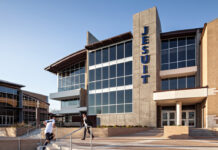Here at Jesuit, there is a great emphasis on service towards others, evidenced by Jesuit’s motto, “Men for Others.” There are a variety of ways Jesuit serves others in the community, such as fundraisers, community service projects, and mission trips. These trips are unique because they allow students to experience firsthand how poverty in today’s world affects not only local communities, but communities around the globe.
This December, Jesuit faculty members Ms. Regina Progar and Mr. Anthony Mattacchione will lead for the first time a group of eight Jesuit juniors to the Boyle Heights area of Los Angeles, a working-class, heavily Mexican-American neighborhood. On this immersion trip, students will be living with families in Boyle Heights, as well as serving the children of the school at Dolores Mission. Boyle Heights once had the largest population of gang members in the US, and students will learn the history of the area and what the city has done to control the heavy gang activity. In doing so, students will be given the chance to live in and experience the extensive culture of the area.
Homeboy Industries, the program behind this immersion trip, began when the women of Boyle Heights, specifically the mothers, felt the desire to change the heavy concentration of gang violence that occurs in the area. These women, along with the Jesuit priests who work there, have started programs as a response to the gangs. One of these programs was Homeboy Industries, which works for gang rehabilitation by helping former gang members to rebuild their lives.
The ultimate goal of the trip is to give students a new understanding of very different demographic, which can be brought back and applied to life in Dallas.
When Ms. Progar and Mr. Mattacchione were scouting the area, they met a man involved with Homeboy Industries who confided in them his life story, how his entire family was involved in gangs and how he didn’t have an opportunity to have another lifestyle. Ms. Progar states that shaking this man’s hand allowed her to realize that she “was going out there to help these people.” In bringing these students on the trip, Ms. Progar hopes the students will realize that “we are not just people for others, we are people with others.”
Mr. Mattacchione added that “sometimes we need to step out of our comfort zone to realize the need within our own community.” By placing students in this unfamiliar environment, Mr. Mattacchione hopes that students will begin to see life through “an Ignatian lens, giving aid to the marginalized who are not in our own communities.”






